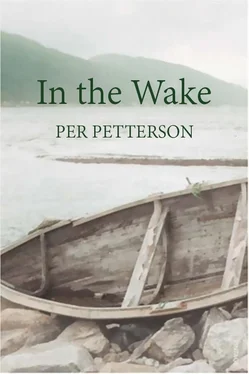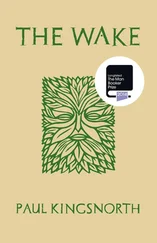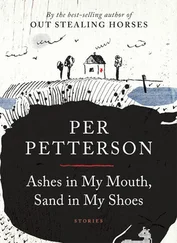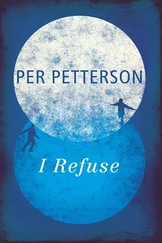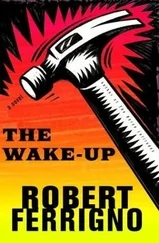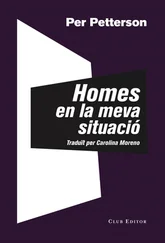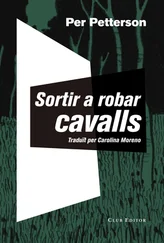The traffic gets thicker. I am approaching Oslo. I drive past a sign which reads: Svartskog 3 km. Just after that I stop, signal and make a U-turn, drive back and on to the Svartskog road, up the steep hill with sharp corners I always thought looked eerie when I was small and sat right at the back of the bus looking out of the window and could not see the road at all, but only straight down into the abyss. Then I go over the top where the road levels out, and drive past Svartskog church and the big oak tree which isn’t as big as I remember, but still pretty sizeable, with strong bare branches I could build houses in if I were thirty years younger or more, and then past the post office, which is still here in the middle of no man’s land, and I roll down the hills alongside the forest to Bunnefjorden. At Bekkensten Quay the old kiosk has vanished without trace. No-one is fishing from the rocks now as the ice is thick along the shoreline and hundreds of metres out, and I park in the space where the kiosk used to be and walk up the hill on the gravel road with cottages on the right side of the incline to the fjord, which gets steeper and steeper as it gets to the top. The last cottage stands back from the road with a yellow-painted fence alongside the road and a yellow-painted gate hinged firmly to two posts carefully built with large stones, and in the narrow garden is a flagpole with a slack line. The cottage looks as it always looked; red-painted timbers with a slate roof, but it is so hopelessly much smaller than I remember, and it is hard to realise it can hold everything I have filled it with since I was last here in 1971. I was nineteen then. The cottage was being sold, and I had gone with my father to fetch some of his things, tools mainly and one or two chairs, and I knew he did not want to sell and had been outvoted by his brothers and sisters. They needed the money, they said. So did my father, of course, but hell, he had almost built that cottage single-handed, and even though he had good reason not to be there much any more, it was painful for him to see it go. I could understand that.
In those years my brother was at school in England, and that was why I went with my father to Bunnefjorden and not him , and it was so unusual for one of the family to be at school in another country, in England even, that hardly anyone talked about it. I felt abandoned. I did have two other brothers, but they were younger, and I had been Little Brother for so long that it was all I was fit for, so they lived their life independently of me, and that was something my mother held against me for as long as she lived. I do not know what she thought I could have contributed.
“It’s really a shame to have to sell this cottage,” I said as we carried the last things out to the van we had borrowed from a neighbour in Veitvet who was a driver for a toy factory, and had his basement filled up with things he had filched from work. But he had no children.
“Do you think so?” my father said.
I said it because I knew he felt it was a shame and much more. To me that cottage was full of memories of uncles and aunts and bladderwrack and glass jellyfish and physical defeats I could well live without. I had no room for it. My life was filled to bursting point, and it had been like that the year before and the year before that, and as long as I had been thinking with the better part of my brain; each year bombarded me with choices I did not understand at all and which left no room for anything more; my throat was dry from running to catch up, always too late, and the last thing on my mind was fishing for mackerel and cod in the Bunnefjord. I had sweated digging trenches and laying cables for the telephone company the whole summer to make enough money to get away to visit my brother in England, and I had enough for the ticket but not for accommodation yet. I had planned to stay for four weeks, at least.
“Of course it is, isn’t it?” I said.
“Sure,” he said.
That was the end of that conversation. The previous day I had bawled him out and told him he belonged to the most backward part of the working class because he subscribed to Aftenposten , so it was not that odd that so little was said.
When we pulled the doors shut and drove down the hill towards Bekkensten Bridge I did not look back, maybe because it was I who was driving.
But my father did.
Most of the trees have vanished from the steep slope between the cottage and the water. They were felled quite recently, and still some trunks are lying in the very spot where they fell. There’s a smell of fresh timber, and where the light and the view of the fjord used to be filtered through the trunks, it is open now, and bleak and miserable and drained of magic. Where before there was a little wood that held everything in place, now there is not a stone’s throw to the water. Just a small quiver and it would all slide into the waves. I walk back down the hill to the car.
*
It is almost silly. I drive out to buy some food from a place about ten kilometres north-east of Oslo, and a few hours later I drive into town from the south, over Hauketo and up the hills near Ljan towards Nordstrand, where the East End merges into a posher West district, and though I do not have a plan it looks like a plan, for I turn into a side road among big detached houses and down past Ljan station and along yet another side road, and stop a hundred metres from the school sitting there brick-grey and massive. I glance at my watch. In ten minutes the bell will go at the end of the last lesson. I open the window and roll a cigarette, and sit and smoke while I wait. I can do it now, luckily, for this is not a good place to stand at the roadside throwing up.
I switch on the ignition and listen to the radio while I smoke and look over at the school, and when my cigarette burns down to a fag end I switch off. And then the bell goes. For just a second the sound hangs in the air, then the doors burst open and children stream out into the playground. At the gate the crowd splits up along the various roads, some go up, some down, while others stand about chatting for a bit, and a little group crosses the road towards my car. I spot the red cap at once and hear her voice through the open window. Suddenly I lose courage and sink down in the seat and stare at the dashboard. I don’t even know if I am allowed to be here. But it is too late. She has seen the car and opens the door to the passenger seat, and gets in and sits looking through the windscreen. She is twelve years old.
“Hi, Dad,” she says.
“Hi,” I say. I pull myself up in my seat, still looking ahead. We both stare out of the window at the school.
“How are you?” she says.
“Not so bad,” I say. “And you?”
“Doing fine, apart from maths.”
“And your sister. Is she getting on OK?”
“She thinks everything’s boring.”
“That’s nothing new.”
She laughs. “No,” she says, “but I don’t know if she really means boring, even if that is what she says.”
“You’re probably right there.”
She falls silent, then turns to look at me, I can feel it, and I can hear she is smiling.
“Are you going to kidnap me now, or what?”
I look at her. Her mouth is not smiling. Maybe I was wrong.
“No, well, that’s not what I planned, actually,” I say. As if I had been planning anything. “Would you like to be kidnapped, then?”
“That’d be fine, but not like in the movies, please, I have to be home by five, Mum will be back then. And I’ve got a lot of homework.”
“An hour’s kidnapping, maybe.”
“That’d be great, Dad.”
I haven’t seen her or her sister for two months and before that only sporadically for two years. I start the car and turn by the school entrance, then drive back some distance the way I came, and out on to Gamle Mossevei beside Gjer Lake to the Villa Sandvigen, a café with a view of the water. So I have driven in a circle, for a little further on there is a signpost reading Svartskog 3 km. I park in the space facing the entrance on the opposite side of the road. When my daughter gets out and walks round the car without her rucksack on, I push my index finger into her neck, tense my thumb like the hammer on a revolver and say: “OK, hands up.”
Читать дальше
